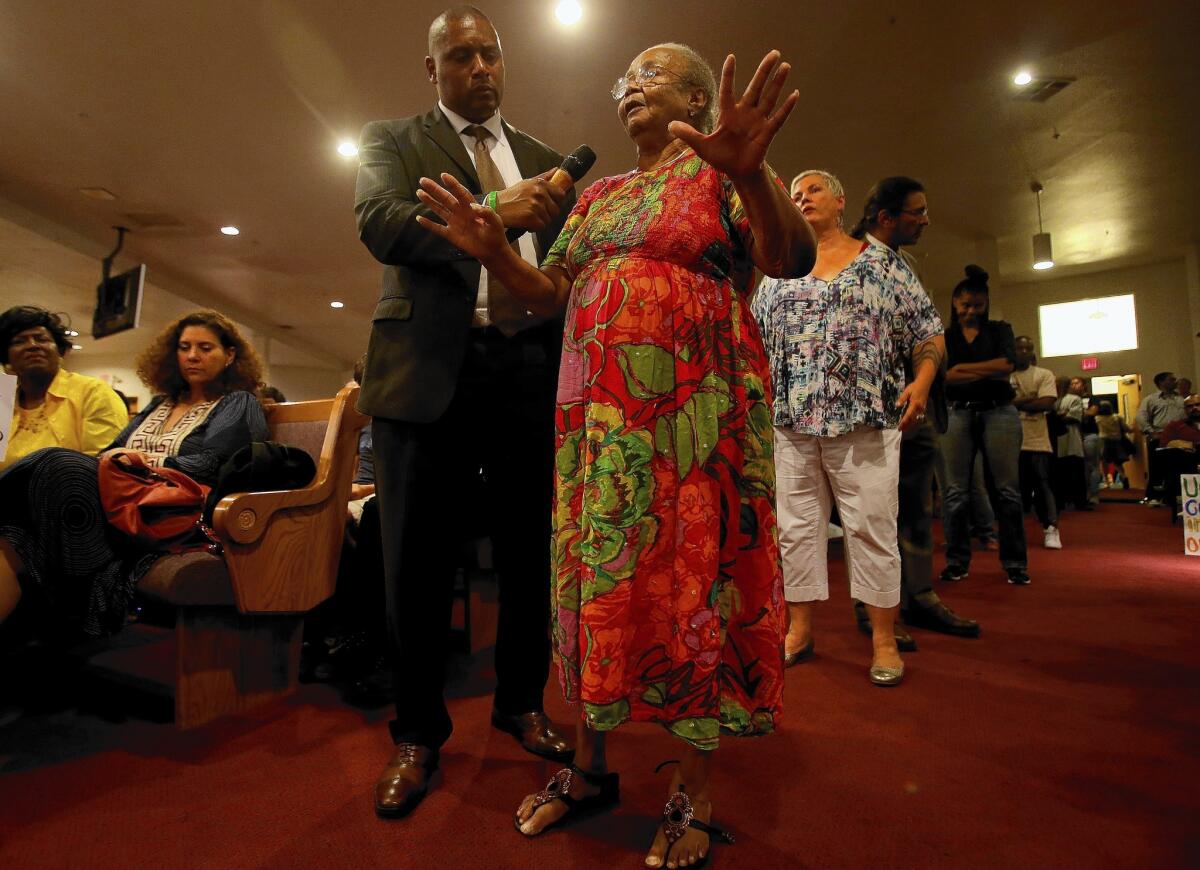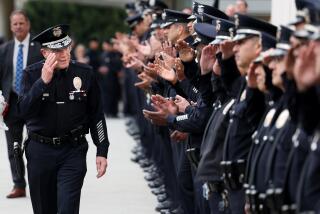LAPD shooting tests South L.A.’s fragile goodwill toward department

Los Angeles police Assistant Chief Earl Paysinger sat with increasing unease at a church in South Los Angeles as residents rose one at a time to berate his department.
The meeting had been called to reassure locals about the way the LAPD and other agencies were investigating the recent fatal shooting of a mentally ill man in the neighborhood. But the event quickly boiled over into a critique of the LAPD, with residents accusing the department of racial profiling, excessive force and dishonesty.
Paysinger, the LAPD’s highest-ranking black officer and a 40-year department veteran, was disturbed by the level of anger. So the morning after last week’s community meeting, he drove to the LAPD’s Newton Division, where the fatal shooting occurred, and demanded an action plan.
“Where do we go from here?” Paysinger told the station captain. “I’m not interested in, ‘I don’t know, we’ve done everything.’”
Whether police officers acted properly when they fatally shot Ezell Ford Jr. earlier this month remains under investigation. But the case has exposed lingering tensions as well as what some consider an erosion of the credibility and goodwill the LAPD has worked so hard for so long to build in South L.A.
“You think you’re in a good place,” Paysinger said. “But then you find yourself at that meeting.… It was patently clear to me that we need to get busy.”
Building trust in the African American community has been a top priority of the LAPD since the L.A. riots 22 years ago, which were sparked in part by the acquittal of four police officers caught on tape beating black motorist Rodney King. Even the LAPD’s harshest critics admit the department has made significant strides.
Those efforts also have been helped in no small part by a dramatic drop in crime across South L.A.
But John Mack, the former longtime L.A. police commissioner and the retired president of the L.A. Urban League, said he worried that the reaction to Ford’s death showed a backslide in the relationship.
He cited other recent incidents that he called “disturbing:” an officer recorded using a racial slur and yet allowed to remain on the force, and South Bureau officers who disabled in-car voice-recording equipment that was installed to monitor them. The recording issue came up at the Ford meeting.
“It’s leading some people to wonder: Is there a pattern? Are they moving back to old practices?” Mack said. “I feel it has become a case of five or six major, enormous steps forward … and we are now taking one or two steps backwards.”
The LAPD’s relationship with South L.A. is one that requires constant nurturing, Mack said. Los Angeles Police Chief Charlie Beck “developed street cred” with the community when he ran the South Bureau as deputy chief, Mack said, but needs to do more as the city’s top cop.
“That is a relationship that requires ongoing attention by the chief himself,” Mack said. “Despite all the goodwill that has been built up, all you need is one incident and things can go south in an instant.”
Marqueece Harris-Dawson, president of the South L.A.-based Community Coalition, said this was an important moment for the relationship between police and residents. He said LAPD officials needed to be more forthcoming with information about police shootings and officer accountability.
“These are the years we need to see more leadership by the Police Department to maintain that momentum,” he said.
Beck attended last week’s community meeting, which was held at Paradise Baptist Church in the city’s South Park neighborhood, and promised “as transparent and as rapid an investigation as is humanly possible in this circumstance.” But to the dismay of some residents, the department has not released the names of the officers involved or provided details about how the altercation started.
Beck promised at the meeting that the officers’ names and the results of Ford’s autopsy would be released.
At the meeting, residents frequently interrupted Beck with shouts and jeers. One man called officers “gang bangers.” Others chanted, “Abolish the police, abolish the police.” The mention of Christopher Dorner — the ex-LAPD officer who blamed department racism for his firing before he went on a deadly rampage targeting police officers last year — prompted at least one person at the meeting to clap.
“That hurts, when people applaud that and make some of those statements,” said Steve Soboroff, the president of the Police Commission. “But we’re trying to get something out of it.… You have to get through that hurt and try to make things better. And hope the other person does the same.”
Soboroff — who described the meeting as a “Pandora’s box” — said that after he left the church that night, he called Beck and other commissioners to discuss their next steps. He called on the department to redouble community outreach efforts.
“Their perceptions, they are what they are,” he said. “We need to work on that.”
Several questions remain about the Aug. 11 death of Ford, a 25-year-old man shot and killed by two officers as he walked home on West 65th Street near Broadway. Police allege that he tackled one of the officers and reached for his gun, prompting both officers to open fire. But a witness who saw part of the incident told The Times she saw no struggle.
Police Commissioner Robert Saltzman said investigating Ford’s death in a thorough and forthright way was crucial.
“For me, the most important question is how the department responds in situations like this one,” Saltzman wrote in an email. “It is important for the chief and the department to make the review of the use of force as transparent as possible.”
Some civil rights advocates believe the years of work between the LAPD and South L.A. residents helped prevent a more extreme backlash to the Ford shooting.
Connie Rice, a civil rights lawyer who has advised both Beck and his predecessor, now-New York police Commissioner William J. Bratton, said the dynamic between the LAPD and the black community is far different than it was years ago. Distrust and concerns still linger, she said, but that’s because there is so much history to overcome.
Decades ago, she said, a controversial shooting could prompt “an immediate explosion of protests.” The demonstrations after Ford’s death have been peaceful, a stark contrast to the violent protests in Ferguson, Mo., following the fatal police shooting of a black 18-year-old man. The shootings of Ford in Los Angeles and Michael Brown in Ferguson took place two days apart.
“When you have a bad shooting, instead of an explosion, heat and friction, it is pretty quiet,” Rice said of Los Angeles. “That is because of a tiny reservoir of benefit of the doubt.”
Two decades ago, Paysinger said, the LAPD wouldn’t have tried to reach out to try to allay concerns as they did at last week’s community meeting. Had they tried, residents wouldn’t have shown up, he said.
Hearing angry voices, he said, was better than hearing none.
“Whether or not it was difficult to sit in that environment and listen? Well, of course,” he said. “But I found great satisfaction, at least in some way, that people came. They had an ability to voice their dissatisfaction with the LAPD because I think somewhere deep down, they do believe that something is going to happen.”
More to Read
Sign up for Essential California
The most important California stories and recommendations in your inbox every morning.
You may occasionally receive promotional content from the Los Angeles Times.












